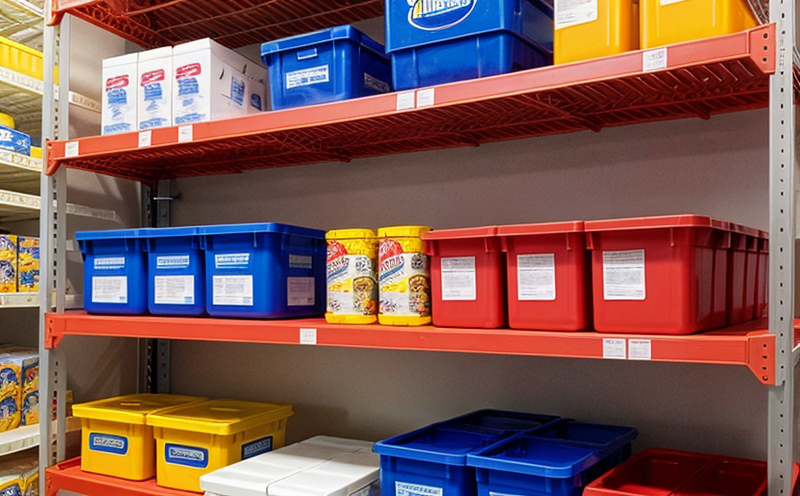ISO 121633 Shelf Life Testing in Frozen Bakery Goods
The ISO 121633 standard provides a framework for assessing the shelf life of frozen bakery goods. This service ensures that food products maintain their quality, safety, and nutritional value over extended storage periods under specified conditions. Shelf life testing is critical in the food & feed sector to ensure compliance with regulatory standards and to optimize product performance.
Shelf life testing involves simulating real-world environmental factors such as temperature, humidity, and exposure to light that can affect baked goods stored at freezing temperatures. The primary goal is to determine how long a product retains its sensory qualities (flavor, texture), microbiological safety, and nutritional integrity before it becomes unsuitable for consumption.
The ISO 121633 protocol is tailored specifically for frozen bakery products like doughnuts, bagels, muffins, and other items that are typically stored in cold environments. By following this standard, food manufacturers can ensure their products meet rigorous quality standards set by regulatory bodies such as the FDA and the European Union's EFSA.
The testing process involves subjecting samples to controlled conditions that mimic actual storage environments. This helps in identifying critical factors affecting product stability, thereby enabling manufacturers to adjust formulation or packaging strategies accordingly.
A key aspect of this service is the use of advanced analytical techniques including microbiological assays and chemical analyses to monitor changes over time. These tests help quantify any potential degradation in terms of microbial load, lipid oxidation levels, acrylamide formation, among others.
Another important factor considered during shelf life testing according to ISO 121633 is the impact of packaging materials on product quality and safety. It’s essential to evaluate whether certain types of paperboard or plastic used in packaging contribute positively or negatively towards maintaining freshness.
In summary, implementing this service allows food companies to gain valuable insights into their products' behavior under different storage conditions. This knowledge can then be leveraged strategically for improving product design, extending distribution networks, enhancing consumer trust through consistent quality assurance practices, and ultimately driving competitive advantage within the market.
Scope and Methodology
The scope of this service includes comprehensive evaluation of frozen bakery goods' shelf life based on ISO 121633 guidelines. Our team will perform accelerated aging tests using controlled temperature chambers to simulate various storage scenarios that could occur during distribution and retail stages.
- Initial sample preparation involves weighing accurately measured portions of each type of baked good selected for testing.
- Specimens are then sealed into appropriate packaging materials similar to those used by the manufacturer before being placed inside controlled environment chambers set at specific temperatures ranging from -18°C down to 4°C.
- At regular intervals throughout the test period, samples are removed from storage conditions and evaluated for physical attributes like color change, texture alteration, etc., as well as chemical parameters such as total lipid content, acrylamide concentration, among others.
Microbiological assessments play a crucial role in determining whether pathogens have grown beyond acceptable limits. Any deviations from established criteria may indicate issues with either the initial product formulation or packaging integrity.
The results obtained from these analyses serve as valuable input for refining production processes and informing future design decisions aimed at extending shelf life without compromising taste, texture, nutritional value, or safety standards.
Competitive Advantage and Market Impact
- Differentiation: By offering ISO 121633 compliant testing services, food manufacturers can differentiate themselves from competitors who may not adhere strictly to these stringent international standards. This commitment translates directly into enhanced reputation among consumers seeking high-quality, safe products.
- Regulatory Compliance: Adherence to global norms like those outlined in ISO 121633 helps businesses avoid costly recalls and fines associated with non-compliance issues. It also opens up opportunities for exports into countries where stringent regulatory frameworks apply.
- Consumer Trust: When companies demonstrate a clear understanding of how their products behave over extended periods, they build stronger relationships with consumers who value transparency regarding product lifespan expectations.
The implementation of this service not only ensures that frozen bakery goods maintain their quality and safety but also contributes significantly to the overall sustainability efforts undertaken by modern food producers. Consumers increasingly demand eco-friendly practices throughout supply chains; thus, demonstrating robust shelf life testing aligns perfectly with these trends.
Use Cases and Application Examples
- New Product Development: ISO 121633 shelf life testing is indispensable when introducing new frozen bakery products to the market. It allows R&D teams to identify optimal storage temperatures, packaging materials, and ingredient combinations that maximize product longevity.
- Packaging Optimization: By understanding how different types of packaging affect product quality over time, food manufacturers can make informed choices about which materials best suit their needs regarding cost-effectiveness while maintaining safety and freshness standards.
- Supply Chain Management: Knowing the precise shelf life for each type of frozen bakery good enables better planning for inventory management and distribution logistics. This reduces waste by ensuring products are delivered fresh to retailers just before expiration dates.
In addition, this service supports compliance with various international regulations applicable across different regions. For instance, the Codex standards recommend using shelf life testing methods consistent with ISO 121633 when evaluating frozen bakery products.





